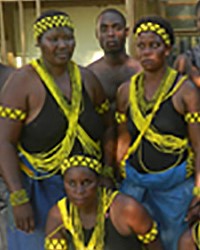Nyemba, Ngangela in Angola

Photo Source:
Copyrighted © 2026
International Mission Board-SBC - Kawaya Petulu Anton All rights reserved. Used with permission |
Send Joshua Project a map of this people group.
|
| People Name: | Nyemba, Ngangela |
| Country: | Angola |
| 10/40 Window: | No |
| Population: | 1,192,000 |
| World Population: | 1,210,000 |
| Primary Language: | Nyemba |
| Primary Religion: | Christianity |
| Christian Adherents: | 85.00 % |
| Evangelicals: | 0.20 % |
| Scripture: | New Testament |
| Ministry Resources: | Yes |
| Jesus Film: | No |
| Audio Recordings: | Yes |
| People Cluster: | Bantu, Central-Southwest |
| Affinity Bloc: | Sub-Saharan Peoples |
| Progress Level: |
|
Introduction / History
Ngangela refers to a small ethnic group, but the name has been expanded to refer to other tribes east of the Bié Plateau. Ngangela has sometimes been considered a pejorative name. Each Ngangela group has its own language, although the languages are related. Ngangela groups have their own social identity; they are divided into subgroups. They are also called Nyemba. Ngangelas live mainly in Angola, but some are in Namibia.
Although most live in Angola, a former Portuguese colony, they were not as significantly affected by colonialism as most other tribes. Portuguese attempts to enter their homeland started in the 1880s but largely failed. Ngangelas were not taken as forced labor or forced to pay taxes. The Portuguese did, however, take timber from the Ngangela homeland. The 1975 Angolan Civil War had a greater impact on them than colonialism.
What Are Their Lives Like?
Ngangelas live through subsistence agriculture, the rearing of small animals, and from gathering wild fruit, honey, and other foods. They distinguish between men's and women's work. Women cook and raise children, take care of household matters, plough and plant fields, make pottery, and weave. Women sun-dry foods, especially mushrooms and vegetables, then store them in calabashes. They also brew non-alcoholic and alcoholic beverages.
Men must be ready to fight to defend their families. That means keeping a knife at all times. He clears land of trees and shrubs for new farms. Men also hunt, fish, build huts, and keep bees. A man must take leadership of the family or his wife will take over.
Extended family members educate the children. Children run errands, fetch firewood and water, weed fields, and clean the area surrounding the village. Boys herd livestock. Those who have been circumcised make traps for rodents and birds, which they give to their mothers.
Those who are too old to work are cared for by the entire village as a type of pension, a reward for past services.
Ngangelas have 31 laws for etiquette. They involve such things as rules for greeting others and how to show deference to those above you.
What Are Their Beliefs?
They believe in ancestral spirits that can be invoked to intervene in their affairs. Therefore, when a person dies, they return as a spirit to watch over their family members, ensuring they lead a good life and enjoy good health. Ngangelas offer prayers and sacrifices to ensure that ancestral spirits bring them good things. Nature holds divine powers, and it's present in plants and trees. They believe such matters ensure their needs are met.
Most are also Roman Catholic. Catholic doctrines are blended with their ancestral beliefs.
What Are Their Needs?
There are times when water is scarce in southern Africa, and that affects farming needs. The Ngangelas need dependable irrigation. Medical care is too far away to access during an emergency.
Prayer Points
Pray for revival in Ngangela churches, drawing thousands to a close relationship with the King of kings.
Pray for Ngangelas to soon join the worldwide movement to take Christ to the remaining tribes that lack a gospel witness.
Pray for gospel recordings and other audio materials will become easily available to every Ngangela family.
Pray for the Lord to provide abundantly for their spiritual and physical needs as a sign of his power and goodness.